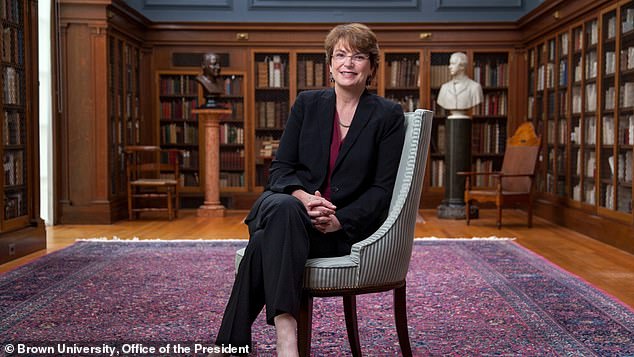Have top colleges HARMED clever minority students by axing SATs to boost ‘equity’? Experts say test is best way of spotting disadvantaged children with enormous potential
Standardized testing, which has been declining as a factor in admissions to elite universities since coronavirus lockdowns, may be the best indicator of which students will do well, a new study shows.
A liberal focus on the diversity of admissions at top colleges has led to criticism of standardized tests, such as the Scholastic Aptitude Test (SAT), for giving an advantage to socioeconomically advanced applicants over disadvantaged ones.
However, moving away from such tests may actually have harmed disadvantaged students, according to new research from the group Opportunity Insights.
The study, which covered the Ivy Plus colleges (the eight in the Ivy League, along with Duke, MIT, Stanford and the University of Chicago), found that standardized test scores were the best indicator of how well a student would do at University.
On the other hand, the study found that high school grades showed little correlation.
Standardized tests may be the best indicator of which students will do well in college, a new study shows
“Test scores have much greater predictive power than is commonly believed in popular debate,” says John Friedman, a professor of economics at Brown and one of the authors of the Ivy Plus admissions study. told the New York Times.
“Standardized test scores are a much better predictor of academic success than high school grades,” agreed Christina Paxson, president of Brown University.
The Opportunity Insights study found that standardized testing was also a good predictor of success outside of college, including whether students did well enough to be admitted to a top university or hired by an attractive company.
Their data shows that within each racial group, students with higher scores do better in college. The same goes for both poor and rich students.
Bruce Sacerdote, one of the scientists who worked on the study, told the Times he hoped this would alleviate some people’s concerns that SAT scores are only a proxy for income or race.
“When you don’t have test scores, the students who suffer most are the ones with high grades at relatively unknown high schools, the kind that rarely send kids to the Ivy League,” said David Deming, a Harvard economist who also works on the research worked. , said.
Adding, “The SAT is their lifeline.”
“It’s not politically correct,” said Charles Deacon, the dean of admissions at Georgetown University, which does require test scores.

Stuart Schmill, the dean of admissions at MIT, (pictured) said the reintroduction of standardized testing led to the university having the most diverse student body last year

Christina Paxson, president of Brown University, (pictured) supports the use of standardized tests in college admissions
MIT is so convinced by the growing body of evidence that they have reinstated their standardized testing requirements as part of the college admissions process.
MIT suspended its testing requirement for two years during the pandemic.
However, after reviewing fifteen years of data, officials found that students who were accepted despite lower test scores were more likely to struggle or drop out.
They also found that the scores were useful in identifying disadvantaged applicants who would succeed at MIT.
Stuart Schmill, the dean of admissions at MITtold the Times that “simply being honest is not enough information to know whether the students will succeed or not.”
“When we brought back the testing requirement, we admitted the most diverse class we’ve ever had in our history,” Schmill explained.
In the university’s current freshman class, 15 percent of students are black, 16 percent Hispanic, 38 percent white and 40 percent Asian American.
About 20 percent receive Pell Grants, the federal program for lower-income students.
The majority of Americans also support the use of standardized test scores as part of college admissions, among other factors.
A large majority of people, across all racial groups, agreed that it should be taken into account in admissions decisions, a Pew Research Center survey found.
